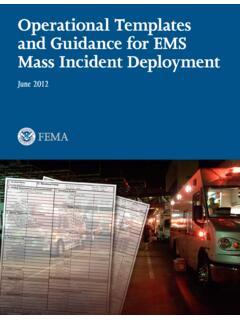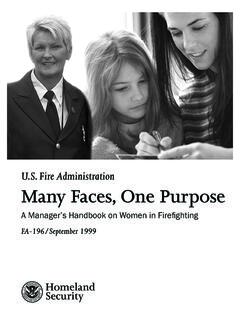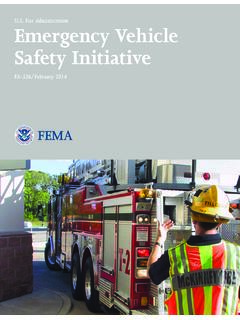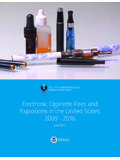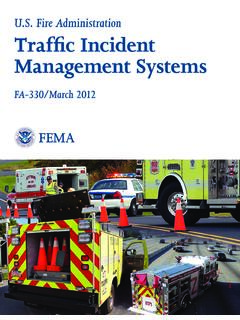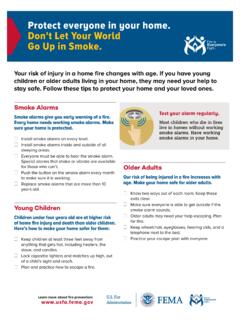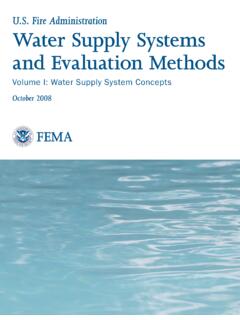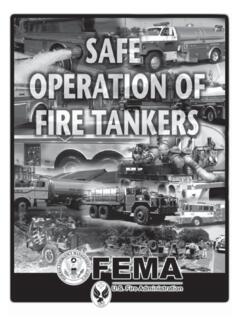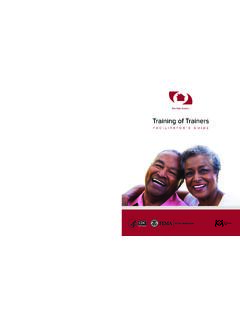Transcription of Operational Lessons Learned in Disaster Response
1 Fire Administration Operational Lessons Learnedin Disaster ResponseJu ne Fire AdministrationMission StatementWe provide National leadership to foster a solid founda-tion for our fi re and emergency services stakeholders in prevention, preparedness, and Lessons Learnedin Disaster ResponseJu ne 2015 Federal emergency Management Fire Administration16825 South Seton AvenueEmmitsburg, Maryland iOperational Lessons Learned in Disaster ResponseTable of ContentsPreface .. 1 The All-Hazard Fire Service ..1 Principles of Whole Community Engagement in the Recovery Phase ..5 Core Mission Capabilities Checklist for Protection, Response and Recovery.
2 6 The Preparedness Cycle ..9 Preparing for Extreme Weather ..10 Resource and Logistics Management ..10 Training, Testing and Exercising ..11 Warning and Notification ..11 Assessing Staffing Requirements ..11 Alert, Callback and Notification ..12 Liaison With Dispatch, Weather Service and Utilities ..13 Mutual Aid ..14 emergency Management Assistance Compact ..15 Accommodations, Food and Support for responders ..17 Physical and Psychological Support for Personnel and Their Families ..19 Protocols to Ensure Personal Safety and Accountability ..20 emergency Mode for No-Notice Events ..22 Operational Support ..22 Special Concerns for Extreme Weather Events.
3 24 Large-Scale Event Incident Command Issues ..30 Coordination With the emergency Operations Center ..32 Centralized Resource Ordering ..33 Form a Community emergency Response Team ..33 Part 2 Critique and Evaluation Methods for Organizational Failure to Learn From Past Lessons ..36 Learning Lessons Learned ..38 Methods of Evaluation: Critique, Analysis and Review ..40A Structure for Evaluations ..41 Frequency of Evaluations ..42 Evaluation of Small-Scale Incidents ..42 Critiques and Hot-Washes ..42 Evaluation of Major Incidents ..44 Incident Data Collection ..44 Overview: The After Action Report ..47An Outline for Conducting an After Action Review.
4 49 Sample Format of an After Action Report ..50iiJune 2015 Conclusion: Turning Lessons Into Reality ..51An Outline for Learning From the Lessons of the 2011 Southeast Tornadoes ..52 BIBLIOGRAPHY ..55 APPENDIX ..57 Examples From AARs In the Words of Those Who Worked the Lessons Learned in Disaster ResponsePrefaceThis report follows extensive research by the Fire Administration (USFA) of after action reviews from major disasters of the past decade into Lessons Learned . The disasters studied were weather-related events that required responding firefighters to assume duties for which they were unprepared or for situations they never relative frequency and severity of extreme weather events and their consequent impact on the population provide ample reason to study what other responders have experienced and what they could or could not do in the face of such challenges.
5 While after action reviews produce valuable Lessons , les-sons alone are not the end of the story. In fact, Lessons Learned should rightly be the beginning of a new chapter in a fire department s Operational behaviors. Lessons without a corresponding change in opera-tional behavior are not Lessons report encompasses and updates the information from two existing USFA publications, TR-162: Fire Department Preparation for Extreme Weather and TR-159: After Action Reports Lessons Learned . The USFA acknowledges the effort of the individuals responsible for producing those legacy works. The updated content from those two publications is coupled in this report with a stronger focus on learning from Lessons Lessons Learned by first responders and emergency managers in the April 2011 tornado outbreak in the southeastern United States provides a rich resource for the fire service to study and apply.
6 Research for this report relied heavily on USFA s publication, Fire Service Operations for the Southeastern Torna-dos April 2011, for Operational Lessons Learned from that the process of researching Lessons Learned in Disaster Response , it readily became apparent that while we have plenty of Lessons Learned there is a gap in applying those Lessons to Disaster Response and recov-ery operations. The material here on applying Lessons Learned references the research work of Amy K. Donahue and Robert V. Tuohy. Their extensive interviews with Incident Commanders (ICs) as reported in Lessons We Don t Learn: A Study of the Lessons of Disasters, Why We Repeat Them, and How We Can Learn Them is published in Homeland Security Affairs, Vol.
7 II, No. 2, July USFA recognizes the following members of its program and training staff for providing content ed-iting and subject matter review for this project:National Fire AcademyRobert J. Bennett, Incident Command SpecialistNational Fire Programs DivisionJohn Carnegis, Fire Program SpecialistPhyllis Krietz, Fire Program SpecialistTimothy O Dowd, Fire Program SpecialistRebecca Ryan, Fire Program SpecialistWilliam Troup, Firefighter Health/Safety SpecialistBruce Hensler, Fire Program Specialist/Project ManagerivJune 2015 IntroductionThe final two decades of the 20th century foreshadowed the future of the fire service in America.
8 Forc-es of natural disasters earthquakes, tornadoes, and hurricanes and acts of terrorism unleashed against densely populated centers highlighted the role of firefighters in first Response . The tragedies that arose from the events of Sept. 11, 2001, and Hurricane Katrina proved the value of firefighters in the emergency man-agement equation. This occurred simultaneously with the self-examination by the fire service of its own record of occupational safety and an effort to learn from its fundamental doctrine of emergency management encompasses specific phases of human intervention ( , preparation, mitigation, Response , recovery) intended as a means of focusing our effort to withstand, recover and restore from Disaster .
9 Significant disasters arise from extreme physical forces of nature, failures of technological systems, and acts of terrorism. emergency managers use the term all-hazards to denote such events. Any of these events may require a Response from first responders . However, first responder agencies may lack the capacity to mitigate the hazards posed by such disasters or may be rendered inopera-ble to some degree by the catastrophic impact of the that assumption, the USFA conducted research to identify gaps and needs in first responder train-ing and resources and to present solutions that serve to better prepare local-level fire services for all-haz-ard events and to interact with federal resources.
10 Local fire departments routinely handle the majority of fires, rescues and medical emergencies without outside assistance. We generally categorize these as low-risk/high-frequency events. However, a given fire department will typically have less experience with large-scale natural disasters, technological accidents, and terrorist attacks. We categorize these events as high-risk/low-frequency, any of which may impact the Operational capacity of a fire experience in Disaster Response confirms that high-risk events threaten and impact fire service in-frastructure presenting unique challenges, it is critical that the nation s fire service be prepared for Disaster responses and the recovery phase.
